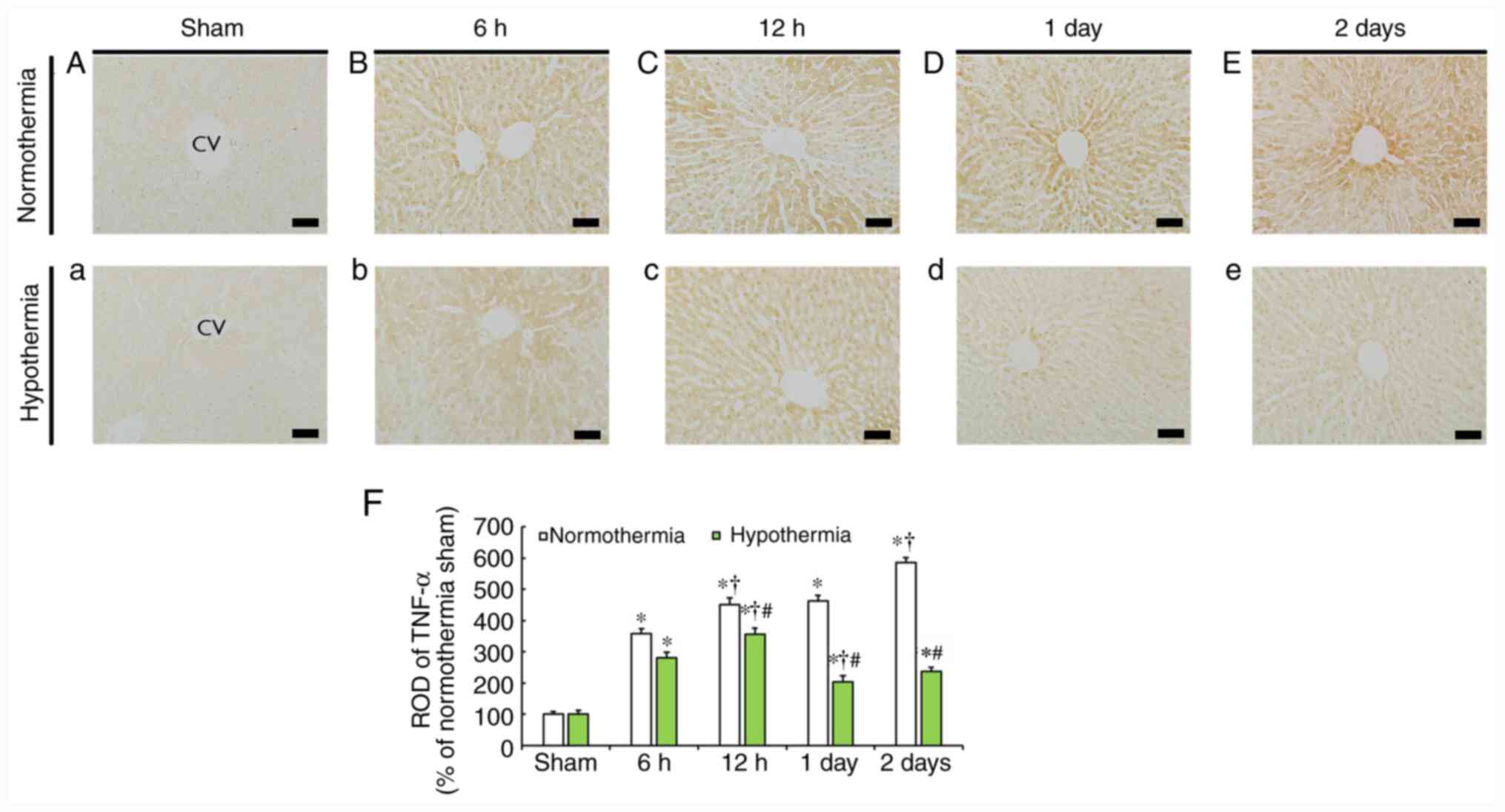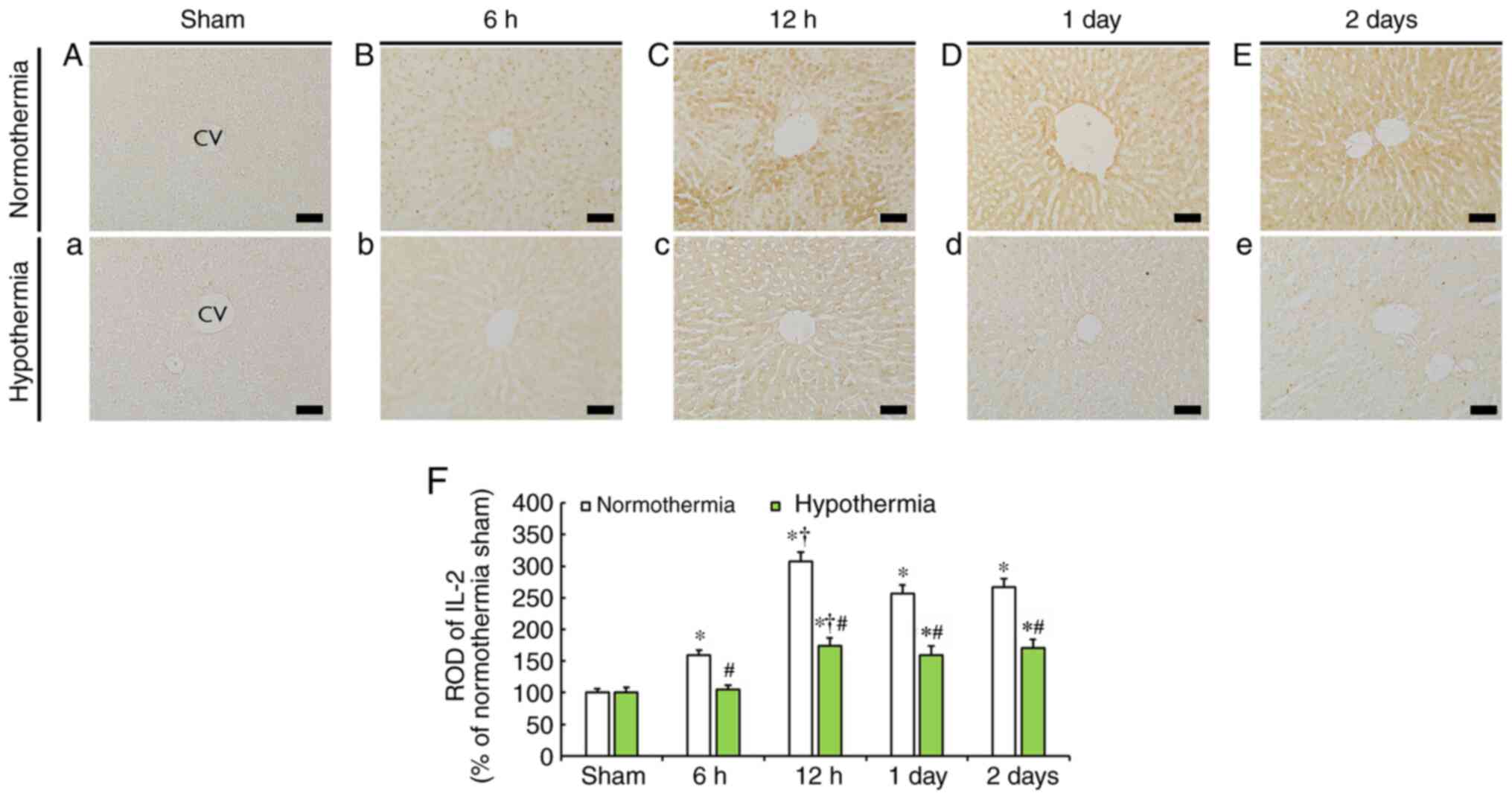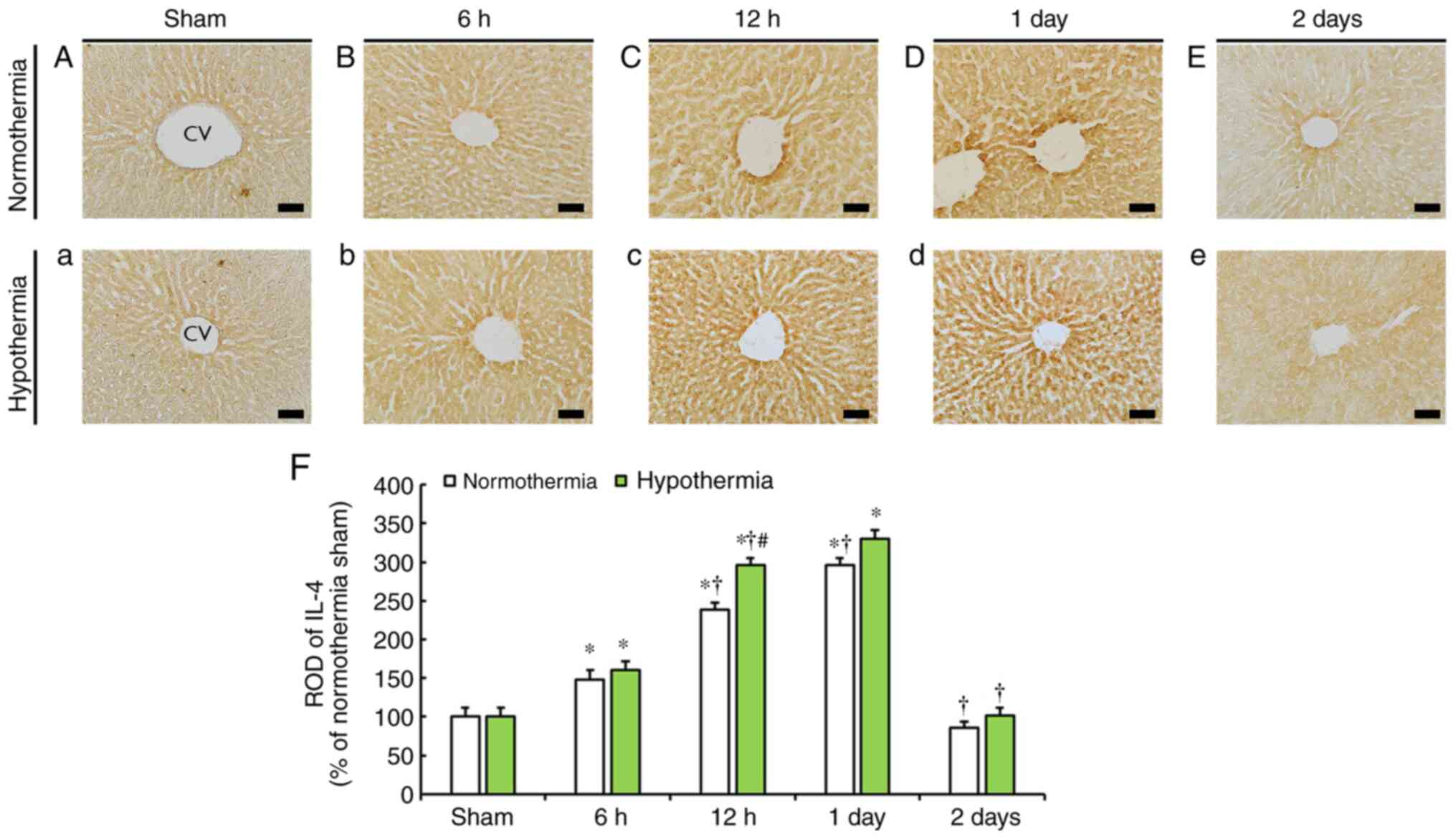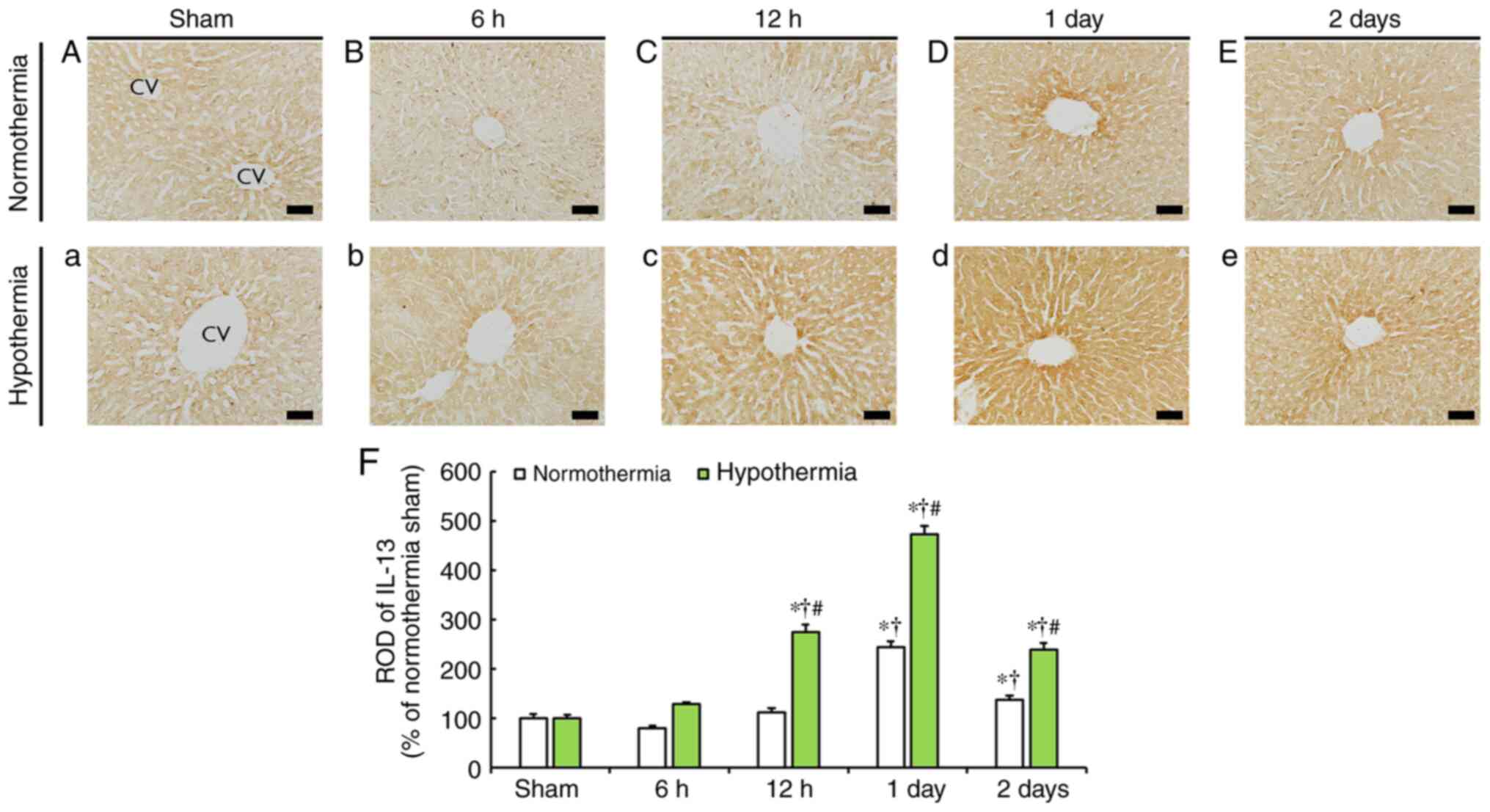|
1
|
Kato A, Okaya T and Lentsch AB: Endogenous
IL-13 protects hepatocytes and vascular endothelial cells during
ischemia/reperfusion injury. Hepatology. 37:304–312.
2003.PubMed/NCBI View Article : Google Scholar
|
|
2
|
Shuh M, Bohorquez H, Loss GE Jr and Cohen
AJ: Tumor necrosis factor-α: Life and death of hepatocytes during
liver ischemia/reperfusion injury. Ochsner J. 13:119–130.
2013.PubMed/NCBI
|
|
3
|
Carr BG, Kahn JM, Merchant RM, Kramer AA
and Neumar RW: Inter-hospital variability in post-cardiac arrest
mortality. Resuscitation. 80:30–34. 2009.PubMed/NCBI View Article : Google Scholar
|
|
4
|
Kida K, Shirozu K, Yu B, Mandeville JB,
Bloch KD and Ichinose F: Beneficial effects of nitric oxide on
outcomes after cardiac arrest and cardiopulmonary resuscitation in
hypothermia-treated mice. Anesthesiology. 120:880–889.
2014.PubMed/NCBI View Article : Google Scholar
|
|
5
|
Miao YF, Wu H, Yang SF, Dai J, Qiu YM, Tao
ZY and Zhang XH: 5'-adenosine monophosphate-induced hypothermia
attenuates brain ischemia/reperfusion injury in a rat model by
inhibiting the inflammatory response. Mediators Inflamm.
2015(520745)2015.PubMed/NCBI View Article : Google Scholar
|
|
6
|
Niemann CU, Feiner J, Swain S, Bunting S,
Friedman M, Crutchfield M, Broglio K, Hirose R, Roberts JP and
Malinoski D: Therapeutic hypothermia in deceased organ donors and
kidney-graft function. N Engl J Med. 373:405–414. 2015.PubMed/NCBI View Article : Google Scholar
|
|
7
|
Niemann CU, Xu F, Choi S, Behrends M, Park
Y, Hirose R and Maher JJ: Short passive cooling protects rats
during hepatectomy by inducing heat shock proteins and limiting the
induction of pro-inflammatory cytokines. J Surg Res. 158:43–52.
2010.PubMed/NCBI View Article : Google Scholar
|
|
8
|
Abu-Amara M, Yang SY, Tapuria N, Fuller B,
Davidson B and Seifalian A: Liver ischemia/reperfusion injury:
Processes in inflammatory networks-a review. Liver Transpl.
16:1016–1032. 2010.PubMed/NCBI View
Article : Google Scholar
|
|
9
|
Eltzschig HK and Eckle T: Ischemia and
reperfusion-from mechanism to translation. Nat Med. 17:1391–1401.
2011.PubMed/NCBI View
Article : Google Scholar
|
|
10
|
Lentsch AB, Kato A, Yoshidome H, McMasters
KM and Edwards MJ: Inflammatory mechanisms and therapeutic
strategies for warm hepatic ischemia/reperfusion injury.
Hepatology. 32:169–173. 2000.PubMed/NCBI View Article : Google Scholar
|
|
11
|
Jaeschke H, Bautista AP, Spolarics Z and
Spitzer JJ: Superoxide generation by Kupffer cells and priming of
neutrophils during reperfusion after hepatic ischemia. Free Radic
Res Commun. 15:277–284. 1991.PubMed/NCBI View Article : Google Scholar
|
|
12
|
Jaeschke H, Farhood A and Smith C:
Neutrophils contribute to ischemia/reperfusion injury in rat liver
in vivo. FASEB J. 4:3355–3359. 1990.PubMed/NCBI
|
|
13
|
Black PR, van Devanter S and Cohn LH:
Effects of hypothermia on systemic and organ system metabolism and
function. J Surg Res. 20:49–63. 1976.PubMed/NCBI View Article : Google Scholar
|
|
14
|
Xiao Q, Ye Q, Wang W, Xiao J, Fu B, Xia Z,
Zhang X, Liu Z and Zeng X: Mild hypothermia pretreatment protects
against liver ischemia reperfusion injury via the PI3K/AKT/FOXO3a
pathway. Mol Med Rep. 16:7520–7526. 2017.PubMed/NCBI View Article : Google Scholar
|
|
15
|
Abdo EE, Figueira ER, Rocha-Filho JA,
Chaib E, D'Albuquerque LA and Bacchella T: Preliminary results of
topical hepatic hypothermia in a model of liver
ischemia/reperfusion injury in rats. Arq Gastroenterol. 54:246–249.
2017.PubMed/NCBI View Article : Google Scholar
|
|
16
|
Behrends M, Hirose R, Serkova NJ, Coatney
JL, Bedolli M, Yardi J, Park YH and Niemann CU: Mild hypothermia
reduces the inflammatory response and hepatic ischemia/reperfusion
injury in rats. Liver Int. 26:734–741. 2006.PubMed/NCBI View Article : Google Scholar
|
|
17
|
Eum HA, Cha YN and Lee SM: Necrosis and
apoptosis: Sequence of liver damage following reperfusion after 60
min ischemia in rats. Biochem Biophys Res Commun. 358:500–505.
2007.PubMed/NCBI View Article : Google Scholar
|
|
18
|
Lee JC, Tae HJ, Cho JH, Kim IS, Lee TK,
Park CW, Park YE, Ahn JH, Park JH, Yan BC, et al: Therapeutic
hypothermia attenuates paraplegia and neuronal damage in the lumbar
spinal cord in a rat model of asphyxial cardiac arrest. J Therm
Biol. 83:1–7. 2019.PubMed/NCBI View Article : Google Scholar
|
|
19
|
Ahn JH, Lee TK, Kim B, Lee JC, Tae HJ, Cho
JH, Park Y, Shin MC, Ohk TG, Park CW, et al: Therapeutic
hypothermia improves hind limb motor outcome and attenuates
oxidative stress and neuronal damage in the lumbar spinal cord
following cardiac arrest. Antioxidants (Basel).
9(38)2020.PubMed/NCBI View Article : Google Scholar
|
|
20
|
Kim YS, Cho JH, Shin MC, Park Y, Park CW,
Tae HJ, Cho JH, Kim IS, Lee TK, Park YE, et al: Effects of regional
body temperature variation during asphyxial cardiac arrest on
mortality and brain damage in a rat model. J Therm Biol.
87(102466)2020.PubMed/NCBI View Article : Google Scholar
|
|
21
|
Cho JH, Tae HJ, Kim IS, Song M, Kim H, Lee
TK, Kim YM, Ryoo S, Kim DW, Lee CH, et al: Melatonin alleviates
asphyxial cardiac arrest-induced cerebellar Purkinje cell death by
attenuation of oxidative stress. Exp Neurol.
320(112983)2019.PubMed/NCBI View Article : Google Scholar
|
|
22
|
National Research Council (US): Committee
for the Update of the Guide for the Care and Use of Laboratory
Animals: Guide for the Care and Use of Laboratory Animals. 8th
edition. National Academies Press, Washington, DC, 2010.
|
|
23
|
Leary S, Underwood W, Anthony R, Corey D,
Grandin T, Greenacre C, Gwaltney-Brant S, McCrackin MA, Meyer R,
Miller D, et al: AVMA guidelines for the euthanasia of animals:
2013 edition. Journal, pp1-102, 2013.
|
|
24
|
Han F, Boller M, Guo W, Merchant RM, Lampe
JW, Smith TM and Becker LB: A rodent model of emergency
cardiopulmonary bypass resuscitation with different temperatures
after asphyxial cardiac arrest. Resuscitation. 81:93–99.
2010.PubMed/NCBI View Article : Google Scholar
|
|
25
|
Drabek T, Foley LM, Janata A, Stezoski J,
Hitchens TK, Manole MD and Kochanek PM: Global and regional
differences in cerebral blood flow after asphyxial versus
ventricular fibrillation cardiac arrest in rats using ASL-MRI.
Resuscitation. 85:964–971. 2014.PubMed/NCBI View Article : Google Scholar
|
|
26
|
Hu T, Wang J, Wang S, Li J, Chen B, Zuo F,
Zhang L, Huang Y and Li Y: Effects of the duration of
postresuscitation hyperoxic ventilation on neurological outcome and
survival in an asphyxial cardiac arrest rat model. Sci Rep.
9(16500)2019.PubMed/NCBI View Article : Google Scholar
|
|
27
|
Jia X, Koenig MA, Shin HC, Zhen G, Pardo
CA, Hanley DF, Thakor NV and Geocadin RG: Improving neurological
outcomes post-cardiac arrest in a rat model: Immediate hypothermia
and quantitative EEG monitoring. Resuscitation. 76:431–442.
2008.PubMed/NCBI View Article : Google Scholar
|
|
28
|
Lee CH, Park JH, Cho JH, Kim IH, Ahn JH,
Lee JC, Chen BH, Shin BN, Tae HJ, Bae EJ, et al: Effect of oenanthe
javanica extract on antioxidant enzyme in the rat liver. Chin Med J
(Engl). 128:1649–1654. 2015.PubMed/NCBI View Article : Google Scholar
|
|
29
|
Carpenter JW: Exotic Animal Formulary. 4th
edition. Elsevier Health Sciences, p744, 2012.
|
|
30
|
Park JH, Park O, Cho JH, Chen BH, Kim IH,
Ahn JH, Lee JC, Yan BC, Yoo KY, Lee CH, et al: Anti-inflammatory
effect of tanshinone I in neuroprotection against cerebral
ischemia-reperfusion injury in the gerbil hippocampus. Neurochem
Res. 39:1300–1312. 2014.PubMed/NCBI View Article : Google Scholar
|
|
31
|
Nakagawa K, Miller FN, Sims DE, Lentsch
AB, Miyazaki M and Edwards MJ: Mechanisms of interleukin-2-induced
hepatic toxicity. Cancer Res. 56:507–510. 1996.PubMed/NCBI
|
|
32
|
Strieter RM, Remick DG, Lynch JP III,
Spengler RN and Kunkel SL: Interleukin-2-induced tumor necrosis
factor-alpha (TNF-alpha) gene expression in human alveolar
macrophages and blood monocytes. Am Rev Respir Dis. 139:335–342.
1989.PubMed/NCBI View Article : Google Scholar
|
|
33
|
Li J, Ke W, Zhou Q, Wu Y, Luo H, Zhou H,
Yang B, Guo Y, Zheng Q and Zhang Y: Tumour necrosis factor-α
promotes liver ischaemia-reperfusion injury through the PGC-1α/Mfn2
pathway. J Cell Mol Med. 18:1863–1873. 2014.PubMed/NCBI View Article : Google Scholar
|
|
34
|
Colletti LM, Remick DG, Burtch GD, Kunkel
SL, Strieter RM and Campbell DA Jr: Role of tumor necrosis
factor-alpha in the pathophysiologic alterations after hepatic
ischemia/reperfusion injury in the rat. J Clin Invest.
85:1936–1943. 1990.PubMed/NCBI View Article : Google Scholar
|
|
35
|
Yang YL, Li JP, Xu XP, Dou KF, Yue SQ and
Li KZ: Protective effects of tumor necrosis factor alpha antibody
and ulinastatin on liver ischemic reperfusion in rats. World J
Gastroenterol. 10:3161–3164. 2004.PubMed/NCBI View Article : Google Scholar
|
|
36
|
Kato A, Yoshidome H, Edwards MJ and
Lentsch AB: Reduced hepatic ischemia/reperfusion injury by IL-4:
Potential anti-inflammatory role of STAT6. Inflamm Res. 49:275–279.
2000.PubMed/NCBI View Article : Google Scholar
|
|
37
|
Cannistrà M, Ruggiero M, Zullo A, Gallelli
G, Serafini S, Maria M, Naso A, Grande R, Serra R and Nardo B:
Hepatic ischemia reperfusion injury: A systematic review of
literature and the role of current drugs and biomarkers. Int J
Surg. 33 (Suppl 1):S57–S70. 2016.PubMed/NCBI View Article : Google Scholar
|
|
38
|
Girotra S, Chan PS and Bradley SM:
Post-resuscitation care following out-of-hospital and in-hospital
cardiac arrest. Heart. 101:1943–1949. 2015.PubMed/NCBI View Article : Google Scholar
|



















